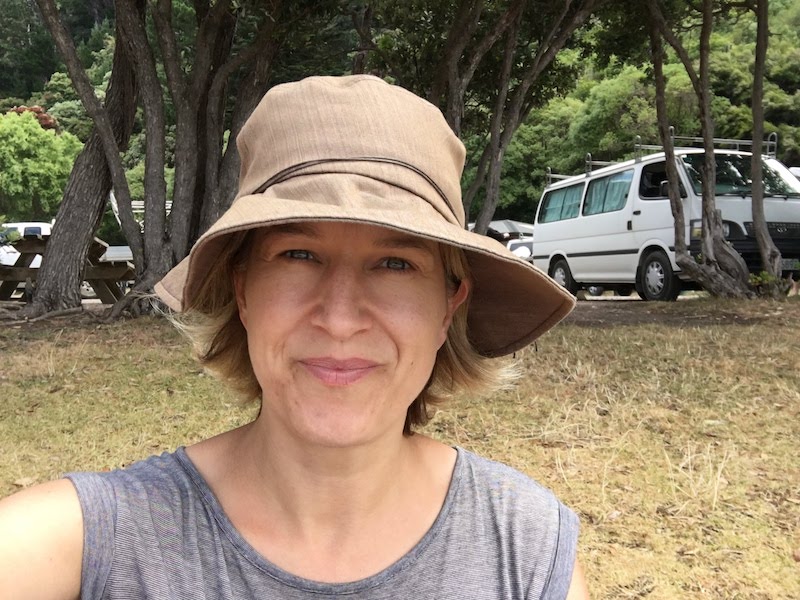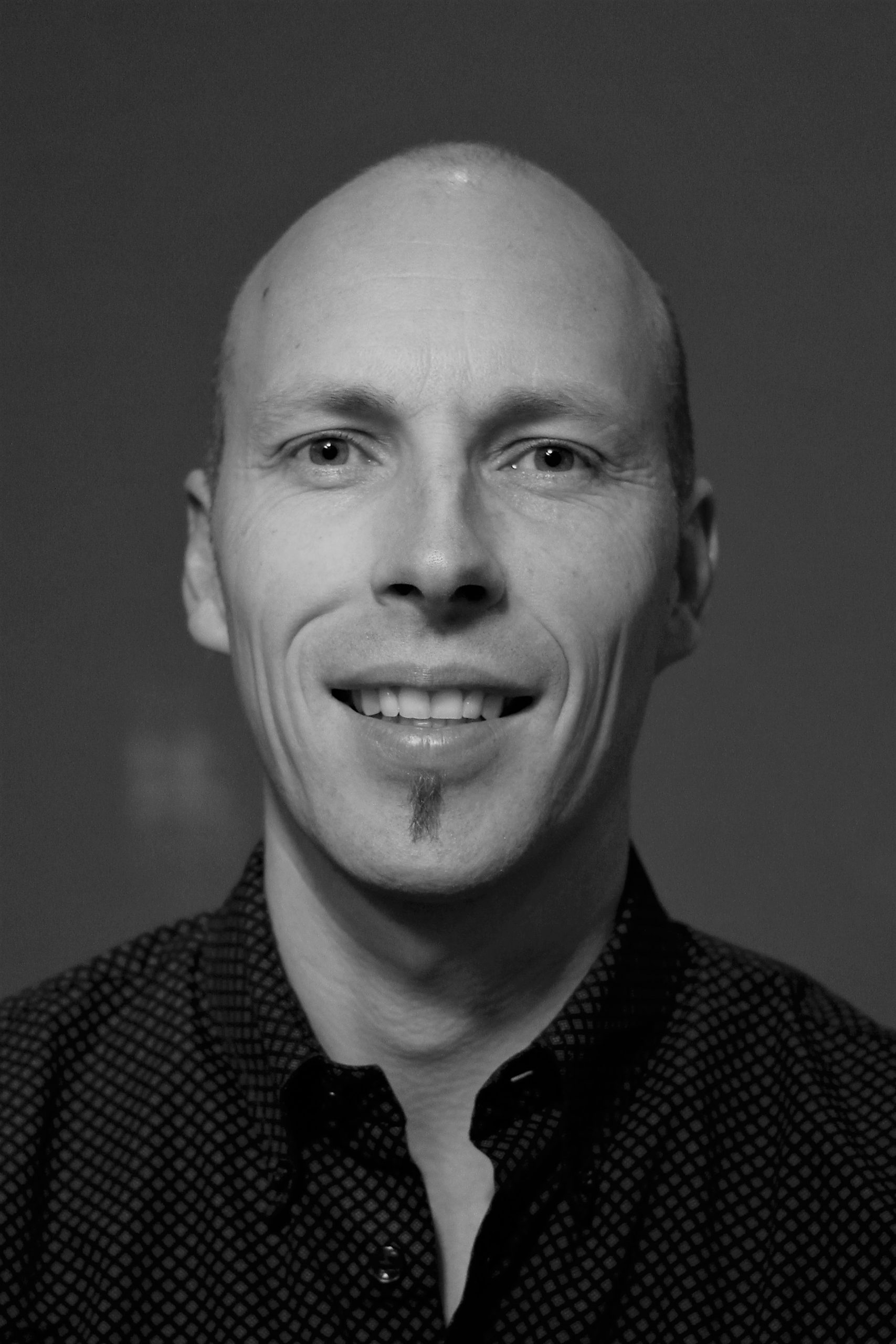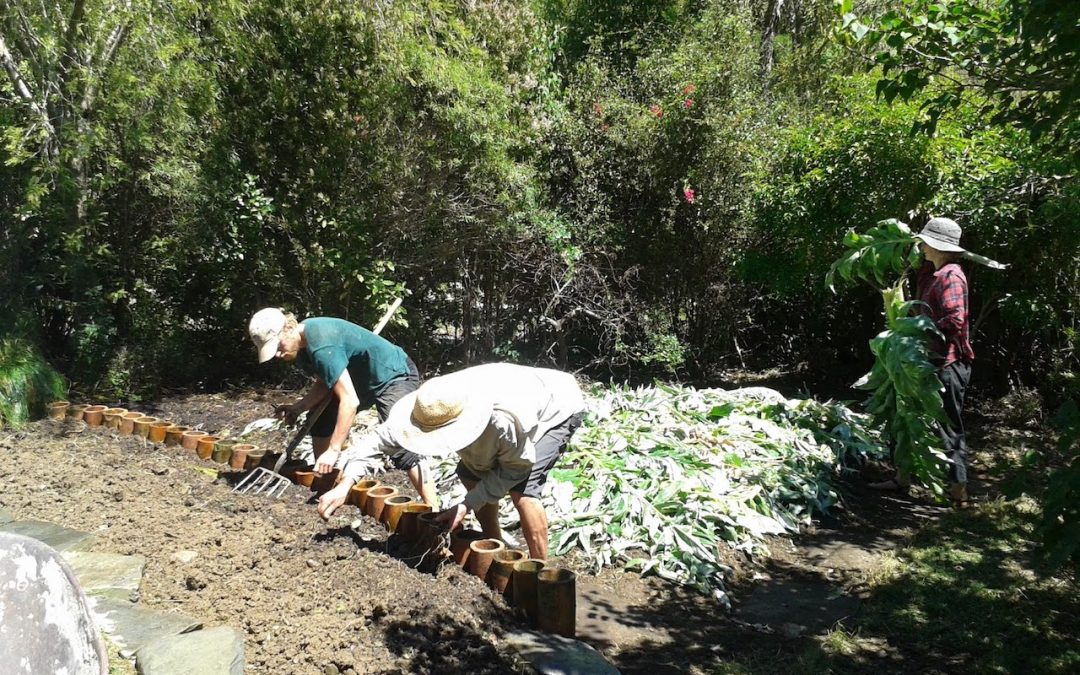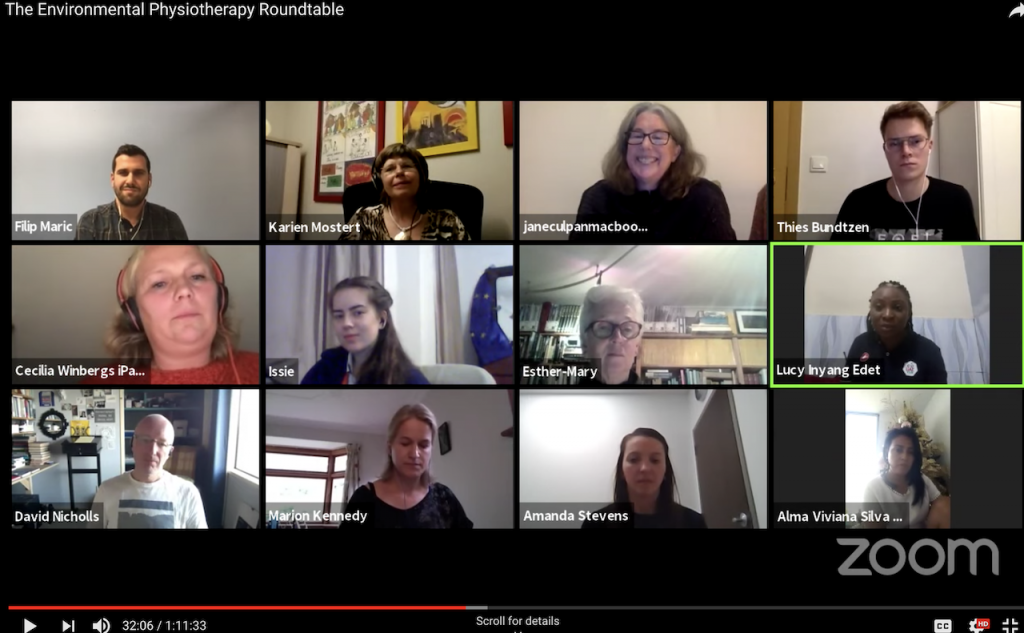On 26 of November 2019, a group of members of the Environmental Physiotherapy Association (EPA) came together in a live-streamed online roundtable to talk about what environmental physiotherapy is, could and should be. This group had come together as our profession develops greater environmental awareness and responsibility, and aims to support a more sustainable future. The international line-up of thirteen speakers included physiotherapy clinicians and students, lecturers in physiotherapy, public health, and physical activity and wellbeing, as well as representatives of World Physiotherapy (WCPT) and the Swedish Physiotherapy Association (Fysioterapeuterna).
One objective of the roundtable was to share our thoughts and understanding of what environmental physiotherapy meant to us in order to broaden each other’s perspectives and find common ground. As each person shared their views it became clear that our interpretations of the term ‘environmental physiotherapy’ were as diverse as our geographical, professional and personal background. .
Some views of what environmental physiotherapy meant to us included:
– Reducing the negative environmental impact of physiotherapy, making physiotherapy practice more sustainable
– Developing strategies to implement aspects of environmental education into undergraduate learning
– Understanding in what ways physiotherapy might already be an environmental practice, and how to highlight and introduce these aspects in education, policies, practice and research
– Highlighting the benefits of exposure to nature as a means of physiotherapy and rehabilitation, while at the same time identifying barriers to ‘getting patients into nature’
– A need to redefine our relationship with the environment. How has our practice of physiotherapy become removed from nature, and how could we become reacquainted?
All felt a sense of urgency to take action and induce change. But how? These diverse viewpoints, while all valid, present a challenge for the group as we seek common purpose and direction. Reflecting on this and subsequent discussions, we can only admire the enormous hope and energy in the ambitions outlined.
Our own views are that physiotherapy has a set of core values that are generally compatible with environmental practices. As physiotherapists we seek to help people get moving again following injuries and illness large and small, reconnecting people with their environments. In order to do this, we typically use physical means, utilising non-surgical and non-pharmaceutical means. While we can certainly strive to improve our relationship with the environment, this is an enormously positive position to find ourselves in. Evidence is increasingly supportive of non-surgical, non-pharmaceutical approaches to health and wellbeing. This fundamentally supports the cornerstones of our professional identity – movement/exercise and education. Yes, we can do more to reconnect ourselves and the people we work with to our environments, yet we feel we can do so without losing our identity as physiotherapists.

Marion Kennedy
PT (PhD Cand)
Marion is a physiotherapist and PhD candidate at University of Otago, Dunedin (NZ) with a focus on clinical anatomy and musculoskeletal physiotherapy. She is also a current Executive Committee member of the EPA and is interested in all things #EnviroPT and movement ecology. She finds happiness on hikes and while dancing.

Ewan Kennedy
Lecturer (PhD)
Dr Kennedy is a lecturer in the School of Physiotherapy at the University of Otago, Dunedin, New Zealand with a focus on musculoskeletal disorders, particularly the cervical spine. He completed his PhD in the clinical anatomy of the anterior neck muscles in 2008, and has since worked as a clinical educator, researcher and teacher. Dr Kennedy has expertise in clinical research, with a particular interest in the overlap between concussion and neck injuries.
“Movement strikes us as one way in which we might begin to approach our modern health and climate problems”
Movement strikes us as one way in which we might begin to approach our modern health and climate problems. The motto of Physiotherapy New Zealand, “Movement for Life” resonates with us. As a profession we are passionate about movement, while many environmental and health issues that confront us today have links to movement, or it’s lack. Convenience can often be translated as ‘moving less’. We all travel, work, connect with friends, eat meals. Modern versions of these activities have had movement stripped from them: we drive, sit on computers, connect online, and eat prepared meals or processed foods. As physiotherapists we know that bodies adapt to the environments they are exposed to, so as we move less we become less capable of moving. When we buy prepared food, someone else has put energy or resources into preparing it for us.
A positive message for the people we work with might be to reclaim their daily movement in the small tasks of daily living, trading some convenience for the benefits of movement. Taking the bike to rehabilitate an osteoarthritic knee has health and environmental impact. Tending gardens, cooking from basic ingredients, using technology less – all can be acts to support both our health and our environment through increased daily movement.
Meaningful conversations with colleagues might include discussing how physiotherapy could have a positive impact on the environment rather than just a less negative impact, and how novel approaches could benefit human and environmental health. For example, could environmental initiatives be considered physiotherapy? We suspect that with a little imagination we can find ways to link individual, public and planetary health. Could squats at the gym plant trees? Home exercises in the garden? Dance instead of walking? Small changes in our approach to common advice might facilitate environmental practices in our communities.
Our relationship with our environment also has a strong cultural element. There is much to learn from cultures that demonstrate stronger and more thoughtful relationships with their environments, as for example in the concept of kaitiakitanga (guardianship) in Māori world view in which the health of a community is reflected in its environment and vice versa.
“…in the concept of kaitiakitanga (guardianship) in Māori world view… the health of a community is reflected in its environment and vice versa.”
As we consider the future of environmental physiotherapy, we find ourselves reaffirmed in our choice of profession. As physiotherapists we are capable of effective, sustainable healthcare that supports both human and environmental health.
Best regards,
Marion and Ewan Kennedy (PhD)



Thanks Jane for sharing on FB.
Nutritious movement with Katy Bowman spring to mind, if you haven’t checked her out already. She has good work I include in my clinical practice as a structural integrator.
Also connect with the environment by looking more at the feet, we have created an environment for them (aka shoes) that stops them from moving, sensing, reacting. Not saying go barefoot but the influence that poor alignment/lack of movement has on the rest of the body is huge. Educate and bring awareness to people of the simple things they can do, and how their wellness can come from engaging with their environment differently.
Love the concept and that discussions are happening, all the best…